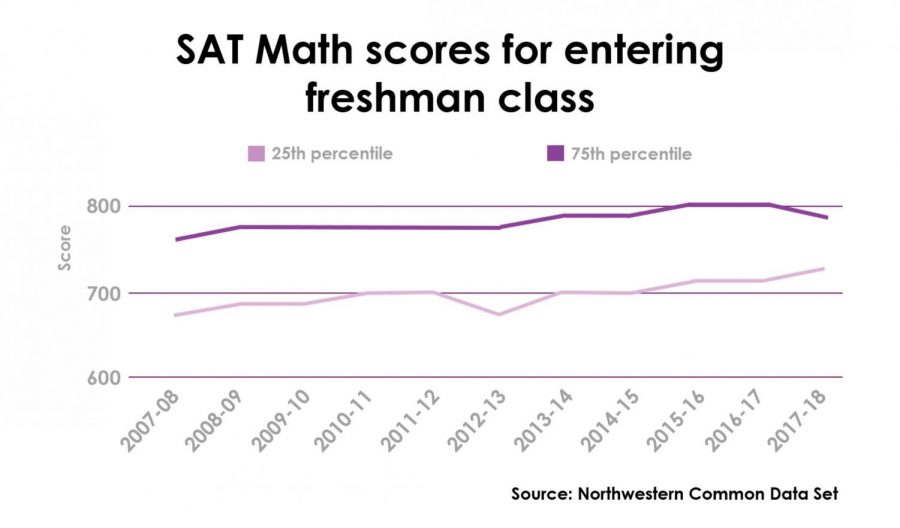College entrance exam scores raise red flags about math achievement
Designer: Roxanne Panas/Daily Senior Staffer
National math scores on college entrance exams began to fall nationwide last year, including at Northwestern.
November 28, 2018
Scores on the ACT and the SAT are raising red flags about college readiness and math achievement across the nation.
Four million high school students took the ACT or SAT in 2018, an increase from 3.8 million students in 2017. Although the number of test-takers has gone up, only 49 percent of these students met the math benchmark for the SAT and only 40 percent met the math benchmark — which is a 22 — for the ACT.
Benchmarks are the minimum scores the College Board, which administers the SAT, and the ACT say students need to succeed in college courses.
A 2018 report from the ACT said math scores nationwide have steadily decreased since 2014, reaching an average of 20.5 — the lowest in 14 years and significantly below the benchmark. SAT data reflect a similar problem: The average score for math is 531 — barely above the test’s math benchmark of 530.
At Northwestern, the 75th percentile of SAT math scores for entering first-year students last fall dropped 10 points from 2016 — although the 25th percentile of scores rose after stalling for a year — according to the most recent University data. Data from the most recent entering class and ACT math scores are not available.
Northwestern first-years who took these standardized tests last year expressed a mix of emotions in regard to the negative trend in test scores.
Medill first-year Michelle Kim said she didn’t expect so many students to not meet the benchmark. Kim said that since STEM fields are becoming more prominent, she thought students would perform better in math.
Still, Northwestern data are relatively positive compared to national trends, as SAT math scores have continued to improve since the University began to gain prominence as an elite school, with 25th percentile SAT scores increasing from 680 to 720 and the 75th percentile SAT scores growing from 770 to 800 before dropping last year.
Although Bienen first-year Jaime An said she felt good about her scores, some of her friends struggled with the quickness the ACT required.
“It could be a bit surprising to some, but some of it could be because of the speed aspect of the ACT which requires a lot of practice that some people may not have been prepared for when taking the test,” An said.
Abigail Holthaus said she feels like math is less applicable than other subjects to many students’ futures, which might be a factor in the test results.
Math, for some, can almost feel like another language, the Weinberg first-year said, so people might not fully immerse themselves due to its difficulty.
“I feel like there’s almost a stereotype against math but really it’s just a different way of studying,” Holthaus said. “I wish we were better at math; maybe we need to implement better math programs.”


